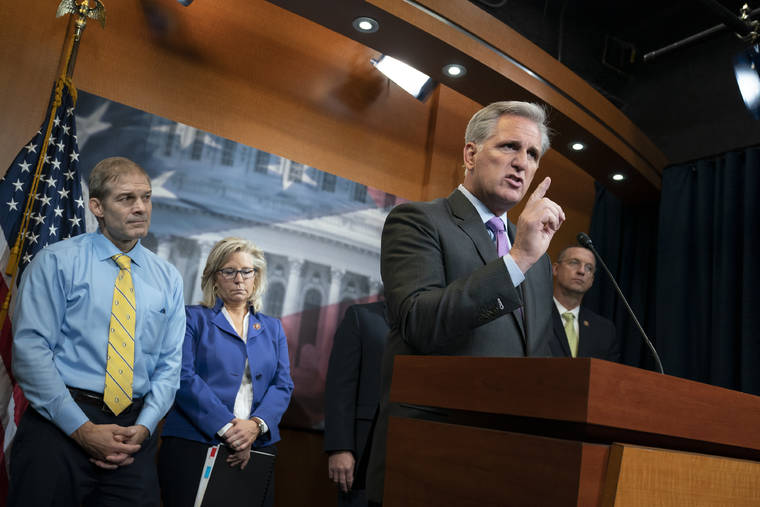WASHINGTON — Congressional Republicans could be nearing crucial tests of their loyalty toward President Donald Trump and of how well they’ve mastered the art of walking a political tightrope during his turbulent presidency.
Should damning evidence accumulate that Trump pressured the Ukrainian president to investigate Joe Biden, a potential 2020 presidential rival, some Republicans facing reelection next year may be forced into a painful political box.
Turn on Trump and risk jeopardizing his presidency and infuriating his staunchly loyal supporters. With the most recent polls showing Trump is supported by 8 in 10 Republican voters or more, any GOP lawmaker who abandons him could well inspire a primary challenge that might be tough to survive.
“If you support impeachment and they don’t, you’re signing your own death warrant,” said Republican consultant Glen Bolger, referring to GOP lawmakers and hardcore Trump supporters.
If the evidence is incriminating enough, standing by Trump could jeopardize support from moderate voters come the November 2020 general election. While most congressional Republicans represent safely GOP areas, those from swing districts and states can ill afford to anger such constituents.
“Very few things animate the base of both political parties like an impeachment discussion,” said Josh Holmes, a former top aide to Senate Majority Leader Mitch McConnell, R-Ky.
An impeachment effort could help Republican candidates from GOP-leaning states, but Republicans from predominantly Democratic states must “figure out how to navigate those waters,” he said.
Republicans said there remained many unanswered questions about Trump’s actions before impeachment becomes a real threat to his presidency.
They also noted that Congress is on the verge of a two-week recess during which lawmakers will hear their constituents’ views first-hand. It will also give pollsters a chance to gauge public sentiment and update surveys that until now have shown that people are mostly against impeaching Trump.
Even so, at least one Democrat was all but rubbing his hands together in anticipation of the difficult spot Republicans face.
“They’re terrified,” Sen. Brian Schatz, D-Hawaii, said of his GOP colleagues. “They’re trying to find a place to land where they can maintain their credibility and their loyalty (to Trump), but at some point you have to choose.”
The White House released a rough transcript Wednesday of Trump’s July conversation with Ukrainian President Volodymyr Zelenskiy. In it, Trump urged his counterpart to “look into” corrupt actions by Biden in Ukraine — of which there is no evidence.
Most Republicans speaking to reporters showed no signs of wavering and said the transcript’s release didn’t trouble them. They said it buttressed a narrative they’ve used throughout Trump’s presidency as he battled questions about Russia’s cooperation with his 2016 campaign — that Democrats are blindly out to get rid of him.
“It confirms what I suspected. Democrats have an impeachment obsession,” said Sen. Steve Daines, R-Mont.
“I haven’t run into anyone yet with a cold foot,” said Sen. James Inhofe, R-Okla., of his Republican colleagues.
Sen. Mitt Romney, R-Utah, who has occasionally clashed with Trump, has been most openly critical of him. He called the transcript “deeply troubling.”
Sen. Ben Sasse, R-Neb., said Democrats shouldn’t talk prematurely about impeachment but sounded a cautionary note for the GOP as well.
“Republicans ought not to be rushing to circle the wagons and say there’s no there there when there’s obviously a lot that’s very troubling there,” Sasse, who has at times criticized Trump but recently won his endorsement for re-election, said in a statement.
Yet in a time when GOP lawmakers have learned to tread lightly when it comes to confronting Trump — many who have done so are no longer in Congress — some facing competitive reelections next year chose their words carefully.
Sen. Susan Collins, R-Maine, said the transcript “raises a number of questions.” She also cited the Senate’s potential role in ultimately judging whether Trump, if impeached, should be expelled from office, saying she’ll be “a juror” and doesn’t want to be “prejudging” him.
Sen. Cory Gardner, R-Colo., perhaps the Senate’s most endangered Republican, said he favored having the Senate Intelligence Committee continue its investigation into Trump’s talks with the Ukrainian president.
He also referred a reporter to a written statement his office had issued. In that statement, Gardner said an impeachment inquiry “to appease the far-left is something the majority of Americans do not support and will sharply divide the country.”
Aides to Sen. Martha McSally, R-Ariz., who is facing both a primary challenge and a potentially difficult 2020 general election bid, steered a reporter to remarks she made Tuesday to Politico. She called Democrats’ impeachment drive a “kamikaze mission” that would hurt that party with voters, but also said she wants to “get to the bottom of this.”
Republicans from closely divided states already have a narrow pathway to victory, and an impeachment effort could complicate their delicate formulas for electoral success, said one GOP senator who requested anonymity to speak frankly about the political prospects of vulnerable colleagues.
Former Senate Majority Leader Trent Lott, R-Miss., a veteran of impeachment efforts against Presidents Richard Nixon and Bill Clinton, said impeachment can be perilous for both parties.
He said Democrats must be wary, noting that Republicans were punished at the polls during their unsuccessful attempt to oust Clinton during the 1990s. But Republicans must be cautious as well, he said, particularly if they conclude they must support Trump’s removal.
“It’s about as tough as it gets, when you’re talking about an impeachment process,” Lott said.



